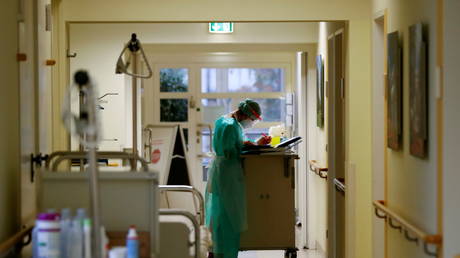
German hospitals are getting overwhelmed by the sharp rise of Covid-19 patients requiring intensive care as opposed to the early months of the pandemic, a hospital association head told local media.
“In states like Saxony, the number of patients in intensive care is five times higher than it was in April. Hospitals are either reaching their capacity limits or have already exceeded them,” Gerald Gass, the head of the German Hospital Federation (DKG), an umbrella group uniting regional hospital associations, told the newspaper Welt am Sonntag.
According to DKG, there are currently 40 percent more Covid-19 patients in ICUs than during the first wave of the pandemic in spring. Furthermore, around 16,000 patients are being treated for the coronavirus in normal wards.
When the first wave hit Germany, smaller hospitals were able to send their seriously-ill patients to better-equipped university clinics, but this now proves challenging as the clinics are oftentimes packed to the brim, the paper said.
The grim picture falls in line with earlier reports by German media that hospitals were struggling with the renewed influx of Covid-19 patients as the cases were rising across the country.
Thomas Koenig, who leads the ICU at a hospital in Berlin, told Deutsche Welle on Friday that all ten of his unit’s beds had been full for weeks. He said ICU personnel have been “stretched thin for years” and there were “too few” qualified nurses, while Covid-19 made the situation even worse.
Uwe Janssens, the head of the German Association of Intensive and Emergency Medicine (DIVI), told Deutsche Welle it was “really uncertain” how hospitals would manage the flow of patients “if things stay the way they are over the next several weeks.”
Germany imposed a partial lockdown in early November and eventually extended the restrictions until January 10. As of Sunday, Germany has had over 1.7 million Covid-19 cases and 18,772 deaths, according to the Robert Koch Institute.
Think your friends would be interested? Share this story!




